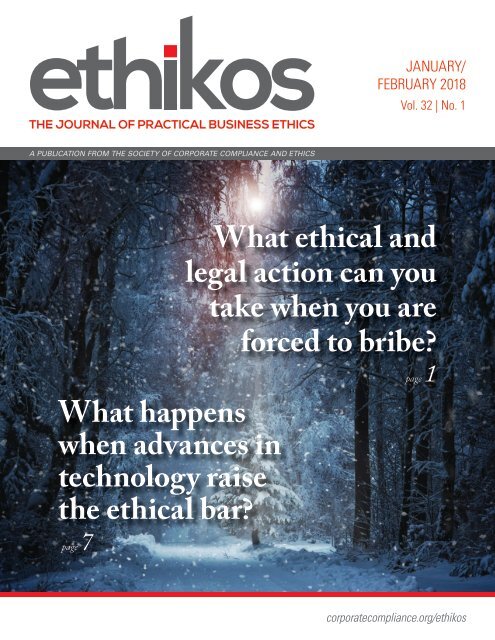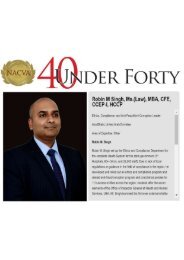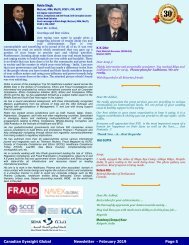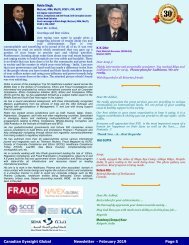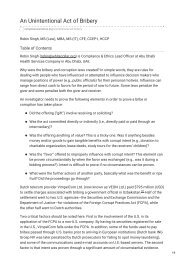What ethical and legal actions can you take when you are forced to bribe?
What #ethical and #legalactions can you take when you are #forcedtobribe? #BRIBERY RESULTS IN OBJECTIVE DUTIES BEING CARRIED OUT IN #FAVOR OF AN INDIVIDUAL’S SUBJECTIVE #INTERESTS.
What #ethical and #legalactions can you take when you are #forcedtobribe? #BRIBERY RESULTS IN OBJECTIVE DUTIES BEING CARRIED OUT IN #FAVOR OF AN INDIVIDUAL’S SUBJECTIVE #INTERESTS.
Create successful ePaper yourself
Turn your PDF publications into a flip-book with our unique Google optimized e-Paper software.
THE JOURNAL OF PRACTICAL BUSINESS ETHICS<br />
JANUARY/<br />
FEBRUARY 2018<br />
Vol. 32 | No. 1<br />
A PUBLICATION FROM THE SOCIETY OF CORPORATE COMPLIANCE AND ETHICS<br />
<strong>What</strong> happens<br />
<strong>when</strong> advances in<br />
technology raise<br />
the <strong>ethical</strong> bar?<br />
page 7<br />
<strong>What</strong> <strong>ethical</strong> <strong>and</strong><br />
<strong>legal</strong> action <strong>can</strong> <strong>you</strong><br />
<strong>take</strong> <strong>when</strong> <strong>you</strong> <strong>are</strong><br />
<strong>forced</strong> <strong>to</strong> <strong>bribe</strong>?<br />
page 1<br />
corporatecompliance.org/ethikos
<strong>What</strong> <strong>ethical</strong> <strong>and</strong> <strong>legal</strong> action <strong>can</strong> <strong>you</strong><br />
<strong>take</strong> <strong>when</strong> <strong>you</strong> <strong>are</strong> <strong>forced</strong> <strong>to</strong> <strong>bribe</strong>?<br />
BY ROBIN SINGH<br />
Have <strong>you</strong> ever been <strong>forced</strong> <strong>to</strong> pay a <strong>bribe</strong> in return for<br />
certain services? Well, if <strong>you</strong> have, <strong>you</strong> could have very<br />
well committed a crime. If <strong>you</strong> haven’t <strong>and</strong> <strong>are</strong> being<br />
<strong>forced</strong> <strong>to</strong>, don’t do it. You will be prosecuted for aiding <strong>and</strong> abetting<br />
a crime.<br />
Bribery is a menace that leads <strong>to</strong> corruption <strong>and</strong> several other<br />
consequences. In this article, we’ll be exploring <strong>bribe</strong>ry, the <strong>legal</strong><br />
aspects of it, <strong>and</strong> how <strong>to</strong> respond <strong>when</strong> asked for a <strong>bribe</strong>.<br />
However, the perspective differs from continent <strong>to</strong> continent<br />
<strong>and</strong> culture <strong>and</strong> culture. <strong>What</strong> would be viewed as cronyism in the<br />
West is seen as sharing the gain resulting from the help of others<br />
in other parts of the world. Some see this conduct as un<strong>ethical</strong>, but<br />
<strong>when</strong> viewed from a cultural perspective of some other continents,<br />
it is regarded as not only <strong>ethical</strong>, but also morally required. Gifts<br />
in the Middle East <strong>are</strong> considered as a gesture of goodwill for the<br />
other person. Most probably, giving a gift is viewed as a <strong>bribe</strong> in<br />
the West. Giving gifts is an integral part of conducting business in<br />
Confucian cultures, where relationships <strong>are</strong> everything <strong>and</strong>, trust<br />
me, for some cultures, relationships <strong>are</strong> everything.<br />
This article appears with permission from the Society of Corporate Compliance & Ethics. Call +1 952 933 4977 or 888 277 4977 with reprint requests.<br />
ethikos January/February 2018 1
The <strong>legal</strong> definition of a <strong>bribe</strong><br />
A <strong>bribe</strong> is <strong>legal</strong>ly defined as the corrupt practice<br />
of accepting, soliciting, <strong>and</strong> transferring<br />
a thing of value in return for an action. The<br />
action here <strong>can</strong> refer <strong>to</strong> anything that is<br />
official or <strong>legal</strong>. For example, if <strong>you</strong> have <strong>to</strong><br />
pay someone at the Department of Mo<strong>to</strong>r<br />
Vehicles <strong>to</strong> provide <strong>you</strong> with a license, <strong>you</strong>’re<br />
paying a <strong>bribe</strong>.<br />
•<br />
THE PROBLEM WITH BRIBERY IS<br />
THAT IT RESULTS IN OBJECTIVE<br />
DUTIES BEING CARRIED OUT<br />
IN FAVOR OF AN INDIVIDUAL’S<br />
SUBJECTIVE INTERESTS.<br />
Bribery aims <strong>to</strong> influence the <strong>actions</strong> of a<br />
person who carries out duties in the <strong>legal</strong> or<br />
public sec<strong>to</strong>r. The problem with <strong>bribe</strong>ry is that<br />
it results in objective duties being carried out<br />
in favor of an individual’s subjective interests.<br />
It is, therefore, a crime <strong>and</strong> both the recipient<br />
of the <strong>bribe</strong> <strong>and</strong> the one offering it <strong>are</strong> punishable<br />
by law.<br />
However, like all <strong>legal</strong> matters, an offering<br />
of value must be first proven <strong>to</strong> be a <strong>bribe</strong>.<br />
For this <strong>to</strong> happen, a “quid pro quo” relationship<br />
must first be established (i.e., it must be<br />
proven that the recipient has purposely carried<br />
out a duty with the intention of providing the<br />
offeror with specific benefits). This is exactly<br />
why campaign donations do not fall under the<br />
category of <strong>bribe</strong>s. A quid pro quo relationship<br />
<strong>can</strong>not be established in these exchanges.<br />
Proving a <strong>bribe</strong> also requires that there<br />
must be intent <strong>to</strong> influence the recipient’s<br />
official <strong>actions</strong>. In some cases, both the recipient<br />
<strong>and</strong> the offeror <strong>are</strong> required <strong>to</strong> have shown<br />
an agreement <strong>to</strong> the exchange. For instance, if<br />
the recipient or offeror has not agreed <strong>to</strong> the<br />
arrangement, the exchange is not necessarily<br />
seen as a <strong>bribe</strong>.<br />
The attempt <strong>to</strong> <strong>bribe</strong> falls under common<br />
law <strong>and</strong> is assessed according <strong>to</strong> the Model<br />
Penal Code. 1 The punishment for <strong>bribe</strong>ry,<br />
whether attempted or completed, is the same.<br />
In fact, solicitation is also a crime as far as US<br />
laws <strong>are</strong> concerned. Whether or not the solicitation<br />
results in the <strong>bribe</strong> being completed<br />
has no effect, <strong>and</strong> the solicitation is still seen<br />
as a crime.<br />
Apart from the fact that crimes interfere<br />
with the regular functioning of public or <strong>legal</strong><br />
systems, they also have an impact on the economy.<br />
Economists state that it leads <strong>to</strong> what is<br />
known as “rent-seeking behavior.” 2 This refers<br />
<strong>to</strong> the practice of increasing one’s wealth without<br />
contributing <strong>to</strong> the creation of wealth.<br />
A good example of this would be the<br />
il<strong>legal</strong> attempts made by corporations <strong>to</strong><br />
influence the open market in order <strong>to</strong> exp<strong>and</strong><br />
their own wealth disproportionately. When<br />
this happens, it leads <strong>to</strong> the improper allocation<br />
of resources, eventually causing an<br />
economic crash or depression. Those who <strong>are</strong><br />
charged with attempting <strong>to</strong> <strong>bribe</strong> or bribing<br />
<strong>are</strong> prosecuted under the federal statute<br />
18 U.S.C. 201 – Bribery. 3<br />
Just say “No”<br />
Is it possible <strong>to</strong> s<strong>to</strong>p someone in the act of<br />
giving gifts/<strong>bribe</strong>s or should one s<strong>to</strong>p it<br />
indirectly? If <strong>you</strong> <strong>are</strong> ever caught in such a situation,<br />
people will always say <strong>and</strong> the court of<br />
2 January/February 2018 ethikos<br />
This article appears with permission from the Society of Corporate Compliance & Ethics. Call +1 952 933 4977 or 888 277 4977 with reprint requests.
law will always question, “Why didn’t <strong>you</strong> s<strong>to</strong>p<br />
or say no on the face of it”? But humans <strong>and</strong><br />
cultures differ in a multicultural environment,<br />
<strong>and</strong> it is not easy <strong>to</strong> say no on the face of it.<br />
However, it may be an operations person<br />
or a compliance officer who knows that “ignorance<br />
of the law is not an excuse” <strong>and</strong> will<br />
be held against that st<strong>and</strong>ard <strong>and</strong> prosecuted<br />
with that objective in mind. The bot<strong>to</strong>m line<br />
is that ethics does not always jive with the<br />
law. No matter the training that compliance<br />
people might conduct, <strong>when</strong> <strong>you</strong> <strong>are</strong> caught up<br />
in a practical situation, more often than not,<br />
the pressures will not allow <strong>you</strong> <strong>to</strong> make an<br />
immediate correct decision. Certain thoughts<br />
would always come <strong>to</strong> mind, such as the pressure<br />
that, “Mr. X is an important vendor <strong>to</strong><br />
my company. Mr. X is in good terms with my<br />
boss. <strong>What</strong> will my superiors think if I reject<br />
this ‘gift’?”<br />
These <strong>are</strong> the exact aspects of the Fraud<br />
Triangle (i.e., pressure, opportunity, <strong>and</strong><br />
rationalization). Together, these three components<br />
lead <strong>to</strong> fraudulent workplace behavior.<br />
However, I see it as the same question as “Can<br />
someone be killed without intent?” The answer<br />
is yes. Imagine a pedestrian crossing a street.<br />
A hot coffee spills on a driver, <strong>and</strong> the distracted<br />
driver does not notice the traffic signal<br />
<strong>and</strong> hits the poor pedestrian. I know it would<br />
be considered a host of things, including negligence,<br />
but not intent.<br />
So what <strong>are</strong> the <strong>ethical</strong> steps one <strong>can</strong> <strong>take</strong>,<br />
<strong>and</strong> <strong>are</strong> only operations people responsible for<br />
facing the brunt of it? Well, I believe no. The<br />
second line of defense is risk management <strong>and</strong><br />
compliance is the third line of defense, <strong>and</strong><br />
both <strong>are</strong> equally responsible. This brings us <strong>to</strong><br />
an aspect of how <strong>can</strong> people be trained, role<br />
play, etc. <strong>to</strong> help employees safeguard themselves<br />
from such situations?<br />
It’s easier <strong>to</strong> say no <strong>to</strong> a parallel person<br />
or a junior employee; however, it’s not easy<br />
<strong>to</strong> say no <strong>to</strong> an ambassador, or a person very<br />
This article appears with permission from the Society of Corporate Compliance & Ethics. Call +1 952 933 4977 or 888 277 4977 with reprint requests.<br />
ethikos January/February 2018 3
high in stature <strong>and</strong>, at the end of the day,<br />
that person will have nothing <strong>to</strong> do with <strong>you</strong><br />
either. But a framework <strong>can</strong> be put in place<br />
by the Compliance function <strong>to</strong> safeguard in<br />
situations of <strong>ethical</strong> dilemmas.<br />
Now, bear in mind that this is different<br />
from being <strong>forced</strong> or asking someone <strong>to</strong> do<br />
something in response <strong>to</strong> a gift (or <strong>bribe</strong>)—an<br />
innocent mind. On the other h<strong>and</strong>, if someone<br />
is trying <strong>to</strong> force <strong>you</strong>, there is something that<br />
<strong>can</strong> help more than law <strong>and</strong> that is courage <strong>to</strong><br />
report. Most of the compliance trainings fail<br />
<strong>to</strong> build courage/open lines of commutation<br />
<strong>to</strong> report, <strong>and</strong> thus people—the first line of<br />
defense—get caught up under a paramount<br />
pressure of the unknown. Not everyone has<br />
the courage <strong>to</strong> be a whistleblower <strong>and</strong> <strong>take</strong> on<br />
corporations by filing a case with government<br />
authorities. Again that courage is an aspect<br />
which requires a cumulative training from<br />
HR <strong>and</strong> Compliance <strong>to</strong> report, <strong>to</strong> help people<br />
build an underst<strong>and</strong>ing that they <strong>can</strong> report,<br />
<strong>and</strong> that <strong>to</strong>ne at the <strong>to</strong>p is just not another<br />
word in the st<strong>and</strong>ard of conduct, as it was in<br />
Enron’s case.<br />
However, the other part of this article<br />
concentrates on the visible aspect of <strong>bribe</strong>ry,<br />
that is, if someone is faced with an intentional<br />
<strong>bribe</strong>, what <strong>can</strong> a courageous employee do?<br />
Anti-bribing laws in the U.S.<br />
In general, statutes such as federal prosecutions<br />
of public corruption under the Hobbs<br />
Act (enacted 1934), the mail <strong>and</strong> wire fraud<br />
statutes (enacted 1872), the honest services<br />
fraud provision, the Travel Act (enacted 1961),<br />
<strong>and</strong> the Racketeer Influenced <strong>and</strong> Corrupt<br />
Organizations Act (RICO) (enacted 1970), all<br />
codified under Title 18 of the United States<br />
Code, were never set out <strong>to</strong> prosecute official<br />
corruption; each has been interpreted <strong>to</strong><br />
provide a means <strong>to</strong> do so.<br />
Over due course of time, the federal official<br />
<strong>bribe</strong>ry <strong>and</strong> gratuity statute, 18 U.S.C.<br />
§ 201 (enacted 1962), the Foreign Corrupt<br />
Practices Act (FCPA) (enacted 1977), <strong>and</strong><br />
the federal program <strong>bribe</strong>ry statute, 18 U.S.C.<br />
§ 666 (enacted 1984) directly address public<br />
corruption.<br />
All of the aforementioned statutes differ in:<br />
•§<br />
their jurisdictional elements,<br />
•§<br />
the mens rea (intent) that they require<br />
(e.g., a quid pro quo or a nexus),<br />
•§<br />
the species of official <strong>actions</strong> that <strong>are</strong><br />
cognizable, <strong>and</strong><br />
•§<br />
whether or not non-public official<br />
defendants <strong>can</strong> be prosecuted.<br />
Specifically, the federal official <strong>bribe</strong>ry <strong>and</strong><br />
gratuity statute defines that whoever indirectly<br />
or directly offers an item of value (usually<br />
money) <strong>to</strong> a public official with the intent<br />
of influencing their <strong>actions</strong> will be required<br />
<strong>to</strong> pay a fine. The fine as an amount is three<br />
times more than the value of the item offered<br />
as a <strong>bribe</strong>. Or, the offender (recipient <strong>and</strong><br />
offeror) will receive up <strong>to</strong> a 15-year prison sentence.<br />
Depending on the case, the punishment<br />
could include both the fine <strong>and</strong> the prison<br />
sentence. The recipient of the <strong>bribe</strong>, who is<br />
usually a public official, will also be dismissed<br />
from his/her role as a public official <strong>and</strong> will<br />
4 January/February 2018 ethikos<br />
This article appears with permission from the Society of Corporate Compliance & Ethics. Call +1 952 933 4977 or 888 277 4977 with reprint requests.
not be eligible <strong>to</strong> hold any official U.S. government<br />
post from there on.<br />
Commercial <strong>bribe</strong>ry, which is defined<br />
as bribing an official working for a private<br />
agency, is also punished under statute.<br />
How <strong>are</strong> whistleblowers protected by law?<br />
Whistleblowers, in <strong>bribe</strong>ry-related scenarios,<br />
<strong>are</strong> those who <strong>are</strong> aw<strong>are</strong> (i.e., personally witnessed)<br />
the act <strong>and</strong> would like <strong>to</strong> inform the<br />
authorities.<br />
The U.S. has established several <strong>legal</strong><br />
precedents <strong>to</strong> protect whistleblowers. There<br />
<strong>are</strong> multiple legislative acts that offer protection<br />
<strong>to</strong> whistleblowers. A couple of examples<br />
would be the No-FEAR Act 4 <strong>and</strong> the<br />
Sarbanes-Oxley Act. 5 These acts outlaw any<br />
form of retaliation against whistleblowers.<br />
However, these <strong>are</strong> some of the newer acts<br />
that have actually been founded upon older<br />
laws. Even the Lloyd-La Follette Act of 1912 6<br />
<strong>and</strong> the Whistleblower Protection Act of<br />
1989 7 have contributed greatly <strong>to</strong> protecting<br />
whistleblowers from retaliation.<br />
For example, securities whistleblowers<br />
<strong>are</strong> protected via wide-ranging legislation<br />
<strong>and</strong> they <strong>are</strong> even encouraged through several<br />
incentives. The Dodd-Frank Wall Street<br />
Reform <strong>and</strong> the Consumer Protection Act of<br />
2010 8 has had the greatest impact in this case,<br />
especially with regard <strong>to</strong> Section 922.<br />
In 2013, the Dodd-Frank Act allowed the<br />
Securities & Exchange Commission (SEC) <strong>to</strong><br />
pay a bounty of $14 million <strong>to</strong> a whistleblower<br />
whose testimony allowed the recovery<br />
of defrauded funds worth $147 million. 9<br />
Under the Act, the SEC is allowed <strong>to</strong> offer<br />
whistleblowers up <strong>to</strong> 30% of the recovered<br />
amount as an incentive. This kind of an<br />
incentive-based whistleblower program has<br />
led <strong>to</strong> more people coming forward with<br />
information.<br />
Apart from financial incentives, Section<br />
922 of the Act also provides protection <strong>to</strong><br />
whistleblowers. A whistleblower will receive<br />
protections against the retaliation that is<br />
likely <strong>to</strong> arise from the <strong>actions</strong> brought on by<br />
the SEC in such cases. In fact, the SEC is<br />
This article appears with permission from the Society of Corporate Compliance & Ethics. Call +1 952 933 4977 or 888 277 4977 with reprint requests.<br />
ethikos January/February 2018 5
dedicated <strong>to</strong> enforcing the provisions that protect<br />
whistleblowers. In some cases, the SEC<br />
has even <strong>take</strong>n action against companies that<br />
have <strong>forced</strong> employees <strong>to</strong> sign non-disclosure<br />
agreements that bar them from whistleblowing<br />
in the future. These agreements <strong>are</strong><br />
actually violations of the Dodd-Frank Act,<br />
which clearly prohibits action that would<br />
impede the freedom of an employee <strong>to</strong> function<br />
as a whistleblower <strong>when</strong> needed.<br />
those messages. If <strong>you</strong> <strong>can</strong> see the number 6,<br />
a person on the opposite side of the table will<br />
see it as number 9.<br />
However, these serious matters need <strong>to</strong> be<br />
addressed promptly <strong>and</strong> action must be <strong>take</strong>n.<br />
Filing <strong>bribe</strong>ry cases on time is of critical<br />
importance. Also, be prep<strong>are</strong>d for the negative<br />
consequences of whistleblowing. It is a serious<br />
matter that <strong>can</strong> have an impact on <strong>you</strong>r<br />
life <strong>and</strong> also the lives of <strong>you</strong>r loved ones. This<br />
matter should be managed internally first,<br />
<strong>and</strong> then the Compliance department should<br />
always live by their words on retaliation policy.<br />
Some countries, such as the U.S., have<br />
strong laws that help people <strong>and</strong> provide<br />
adequate support <strong>and</strong> enough protection <strong>to</strong><br />
whistleblowers. •<br />
Robin Singh (robinsingh002@yahoo.com), Ms.(Law),<br />
MBA, CFE, CFAP, is a Compliance & Ethics Lead<br />
Officer at Abu Dhabi Health Services Company in<br />
Abu Dhabi, UAE.<br />
How <strong>to</strong> <strong>take</strong> action against <strong>bribe</strong>ry<br />
If <strong>you</strong> <strong>are</strong> <strong>forced</strong> <strong>to</strong> pay or receive a <strong>bribe</strong>, the<br />
best approach would be <strong>to</strong> report it <strong>to</strong> the<br />
Compliance/Fraud Control department first.<br />
If they <strong>take</strong> no action, <strong>you</strong> have the option<br />
of reporting it <strong>to</strong> the appropriate authorities.<br />
Never delay the issues. The delay will<br />
incriminate a person. This is as simple as a<br />
joke about Mr. Y that is sent in a <strong>What</strong>sApp<br />
message <strong>to</strong> a person who “liked” it <strong>and</strong> wrote<br />
LOL. Now, if these texts <strong>and</strong> devices <strong>are</strong> later<br />
seized by the authorities <strong>and</strong> investigated, the<br />
same text/<strong>What</strong>sApp message will be seen<br />
as making a mockery of Mr. Y. You never<br />
know what conclusion may be drawn from<br />
ENDNOTES<br />
1 Paul H. Robinson <strong>and</strong> Markus Dirk Dubber: An Introduction <strong>to</strong> the<br />
Modern Penal Code. https://www.law.upenn.edu/fac/phrobins/<br />
intromodpencode.pdf<br />
2 Inves<strong>to</strong>pedia: Rent-seeking. http://www.inves<strong>to</strong>pedia.com/terms/r/<br />
rentseeking.asp<br />
3 18 U.S.C. § 201 Title 18 (Bribery of public officials <strong>and</strong> witnesses)<br />
4 Public Law 107-174 (Notification <strong>and</strong> Federal Employee Antidiscrimination<br />
<strong>and</strong> Retaliation Act of 2002, known as the No FEAR Act). https://www.gao.<br />
gov/about/workforce/nofear.html<br />
5 Sarbanes-Oxley Act Anti-Retaliation Provisions. Information at<br />
https://www.gao.gov/about/workforce/nofear.html<br />
6 Lloyd-La Follette Act of 1912. http://www.encyclopedia.com/his<strong>to</strong>ry/<br />
encyclopedias-almanacs-transcripts-<strong>and</strong>-maps/lloyd-la-follette-act<br />
7 Public Law 101-12: The Whistleblower Protection Act of 1989.<br />
https://www.gpo.gov/fdsys/pkg/STATUTE-103/pdf/STATUTE-103-Pg16.pdf<br />
8 Public Law 111-203: Dodd-Frank Wall Street Reform <strong>and</strong> Consumer<br />
Protection Act. https://www.congress.gov/bill/111th-congress/housebill/4173/text<br />
9 SEC press release: “SEC Awards More Than $14 Million <strong>to</strong> Whistleblower”<br />
Oc<strong>to</strong>ber 1, 2013. https://www.sec.gov/news/press-release/2013-209<br />
6 January/February 2018 ethikos<br />
This article appears with permission from the Society of Corporate Compliance & Ethics. Call +1 952 933 4977 or 888 277 4977 with reprint requests.


